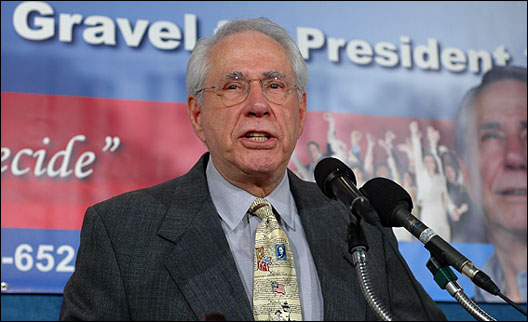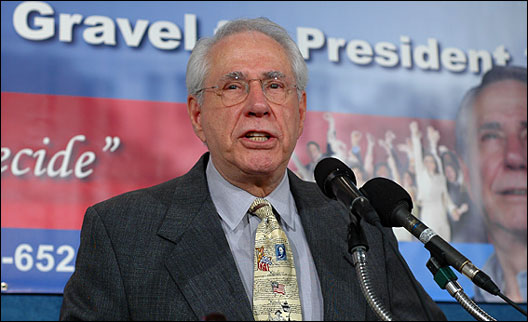
This is part of a series of interviews with presidential candidates produced jointly by Grist and Outside.
Update: Mike Gravel switched from the Democratic Party to the Libertarian Party in March 2008; after failing to secure the Libertarian nomination, he ended his presidential campaign in May 2008.

In his “Rock” campaign ad, Mike Gravel silently stares into the camera, throws a stone into a lake, and walks off into the distance. It’s disconcerting, off-the-wall, and low-budget — just like his presidential campaign.
As a senator from Alaska during the ’70s, Gravel was best-known for fighting nuclear weapons, nuclear power, and the Vietnam War. In his current campaign, to the extent that he’s known at all, it’s for playing gadfly at Democratic candidate debates. In the environmental arena, he’s got some big ideas — an international carbon-tax scheme, a hydrogen-powered energy system, a notion that society needs to end its obsession with growth — but little in the way of practical plans.
Will his quixotic presidential campaign cause as many ripples as his rock? I called him up at his campaign headquarters in Alexandria, Va., to try and find out.
For more info on his platform and record, check out Grist’s Gravel fact sheet.
Listen to a clip of this interview:
What sets your green platform apart from the other candidates’?
First off, I am prepared to impose a carbon tax, at the barrel of oil and at the lump of coal. [Chris] Dodd has talked about a tax on carbon, but the difference is I approach the problem as a global problem — climate change, energy, the whole thing. By putting a tax on carbon in the United States, we can offer our leadership to the rest of the world and say, OK, you put a carbon tax on your people, and then we’ll pool all this money together and we’ll use it to integrate the global scientific and engineering communities to get us off of carbon within a decade. Nobody would be permitted to join this international effort unless they put a carbon tax on their people also.
What do you see as the advantage of a carbon tax over a cap-and-trade program?
The cap-and-trade wouldn’t necessarily lower emissions. Let’s say I’ve got a coal-fired plant and it pollutes. All I’ve got to do is go give some money to somebody who builds a new plant that pollutes less. I get to buy permission to pollute. When you’re capping and trading, you’re not focusing on a solution; you’re just giving somebody a break based upon something that somebody else is doing.
Some say a carbon tax would be political suicide because voters don’t like to be taxed. Your thoughts?
I back it in any case.
In a recent debate we were asked a question: What would you do to reduce the price of gasoline? The candidates all mealymouthed around. My answer before the country was that I would not do anything. The best way to solve the energy problem is to let prices rise so that alternative energies can become more economic.
One of the things we can do is take electricity from windmills, run it through water, and have hydrogen. What is now possible is that we can turn around and have hydrogen liquid. And by altering the technology of our existing cars and gas stations, they can be used to run on and distribute hydrogen liquid. Oh, it blows you away. This can probably be done within five years.
Shift the energy system to hydrogen in five years?
You’re not making hydrogen fuel cells, that technology is not on the table yet. You’re making liquid fuel from hydrogen. Now, first off, I would [raise] CAFE standards immediately, say that within three to five years you’re going to have the same standard as Europe. End of story. Forget the automobile industry. Meanwhile, we can just manufacture the hell out of windmills and then turn around and produce all this hydrogen.
Does coal play a role in your vision for a clean-energy future?
You’ve got to do away with coal. What you can do is outlaw these coal-fired plants and turn them into hydrogen power plants.
Do you believe nuclear power has a role in America’s energy future?
I was the one who started the nuclear [power] critique back in 1969, and we were able to cap [the number of plants in the U.S.] at 150, which have now been ratcheted back to about 105. The nuclear industry is trying to crank it back up again, and a couple of significant environmentalists have bought into that. I have not. If we can have large electrical base-load plants fed by hydrogen, then we don’t have to have the nuclear.
Now if we were to make a breakthrough in nuclear fusion, that would dwarf everything else.
How much of the energy system would you shift to liquid hydrogen?
As much as we can.
Do you have a specific target?
I’m not an engineer, I’m not a scientist. But I’m told it’s not a big deal to tweak gas stations so that you can come up with a truck, dump the liquid hydrogen in there, and pump it in your car. So we shift everything over to liquid hydrogen and there’s no more pollution. The trick is, you’ve got to produce the electricity to be able to put it through the water to create hydrogen, and you do that with windmills. The technology of windmills is totally replicable. And so now you can put those all over the place where you’ve got wind, and then later on you can take down those windmills and have another way of doing it.
I’ve heard that you have a plan to electrify the entire transportation system of the United States.
Yes, I want to superimpose an electric maglev [train] system throughout the country similar to the one that currently runs between the airport and the city of Shanghai. These maglevs can travel 300 miles an hour. Imagine if we could move trucks across this country on electricity at that speed, with no environmental pollution — what that would mean?
There are a couple of companies that have sent me studies that show they can do this right across Manhattan or in downtown Washington, D.C., and it is just awesomely interesting. But you have to have a national commitment to do this, and I don’t see that commitment from the Democrats or the Republicans.
What’s your position on biofuels? What role does ethanol play in our energy future?
What I know about the corn deal, it takes more energy to produce a gallon of biofuel from corn than it does to just use conventional fuel, so that’s a negative. Secondly, we have to realize that when we’re growing this stuff, we may be displacing the whole distribution of food throughout the world.
How about the idea that we could derive fuels from highly fibrous plants?
Like switchgrass? I don’t know enough about that. I’m more excited by the liquid hydrogen.
Many people argue that the U.S. should not commit to any global greenhouse-gas reduction targets that don’t involve China and India. Do you agree, and how would you bring them to the table in a post-Kyoto agreement?
First, I would just get the Kyoto agreement [ratified] and get it out of the way.
The Kyoto targets are phasing out soon, so how would you approach a post-Kyoto agreement?
Accelerate the goals. I’ve read that a number of the European countries are ahead of their Kyoto targets, which really says something. We need to get closer to China and India both to collaborate on technology development — they’re way ahead of us in some areas — and to help them, because you cannot deny them the opportunity to have our standard of living. If we don’t do this in a very clever way, we will doom the Earth to environmental destruction. Period.
After climate and energy, what do you think is the most important environmental issue facing the nation?
Growth.
Urban growth? Population growth?
It’s more complex than that. Our total economy is based upon growth, growth, growth. Well, there comes a time when you destroy so you can have growth.
I want to change our system of revenue from an income tax to a sales tax. That would change this country from a consuming nation to a savings nation. If we begin to look upon growth from a savings point of view, we could do more in the short run with respect to global warming. Our country right now spends more than we earn, and we’re on our way to bankruptcy.
What environmental achievement are you most proud of?
Starting the nuclear [power] critique. And my work on the Trans-Alaska Pipeline in the 1970s. The environmentalists were very much opposed to it. I maintained then, and I still do, that it was a more environmentally sound way to transport oil than the leaky tankers under Panamanian registry and Nigerian registry who were coming into the East Coast of the United States.
Who is your environmental hero?
I’m very fond of my friend Ralph Nader. I think that he is very strong in that area.
Can you tell us about a memorable wilderness or outdoor adventure you’ve had?
Coming from Alaska, I’m very much into the beauty of nature. I don’t hunt or fish, and I’m not a camera buff, but I just love to luxuriate in the wilderness. I’ve done a lot of hiking in my state. The most significant thing I did was climb the Chilkoot Trail with my family.
Also, while I was in the Senate, the head of the Sierra Club in Alaska taught me how to handle a raft in whitewater. At the time, I was opposing some of the Sierra Club’s stuff and I was supporting some of their stuff, and so I accused him of trying to kill me, because that would have solved his problem. But we still are friends today.
If you could spend a week in one park or natural area of the United States, where would it be?
Zion National Park.
What have you done personally to lighten your environmental footprint? Give us a snapshot of your lifestyle — where you live and how you travel.
We drive a Camry — we’re a one-car family — but often I use the subway. I also use the train and the bus. My wife read that the bus has the least environmental impact of all public transport. The worst, of course, is the private jet that my fellow candidates all run around on.
My wife and I live in an apartment in Rosslyn, Va., on the 14th floor. We’re renters, we don’t have enough wherewithal to be able to own something like that — I didn’t get out of the Senate any better [financially] than I went in. Obviously, I’ve got the ability to go and become wealthy, but that’s not what has moved me through my life.
If George Bush were a plant or an animal, what kind of plant or animal would he be?
Oh, my God. [Pause.] I can’t think of a plant or an animal that I have that much disrespect for. Does that answer your question?
Stop and think of all the human beings that have died and suffered because of that S.O.B. I personally believe that impeachment is too light a sentence. These people should be pursued criminally.
You know, when you’re sworn in to be president, you and the outgoing president have to ride in the car together to the swearing-in. When Hoover and Roosevelt rode in the same car to Roosevelt’s swearing-in, they never said a word to each other. And I’ve got to tell you, when I’m sworn in, the same will go for me and George W. Bush.



